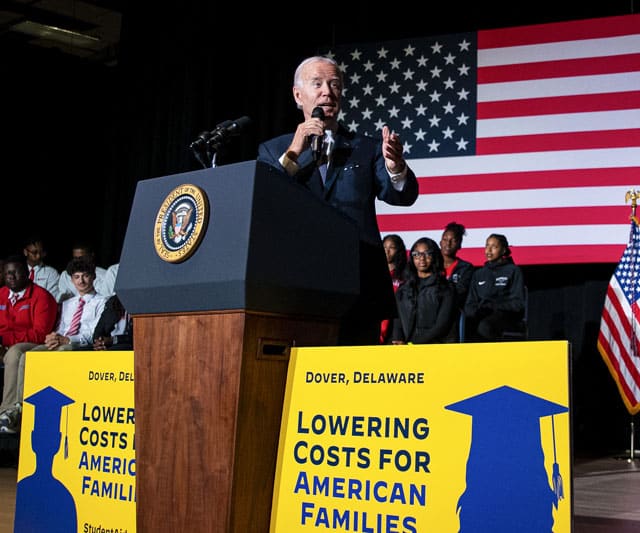President Donald Trump signed an executive order Thursday in an attempt to shut down the Education Department.
“We are sending education back to the states, where it so rightly belongs,” Secretary of Education Linda McMahon said in a statement after Trump signed the order.
But they are not about to let debtors off the hook. Those states, after all, are not banks, and the Education Department is a big bank in all but name. It lends tens of billions of dollars to students and parents each year and oversees the collection of roughly $1.6 trillion in outstanding loans for more than 40 million borrowers.
The debt-ridden federal government isn’t going to give up that money. So if the Education Department closed, another federal entity would take the loan system over. In the short term, any agency inheriting the loan portfolio would need to keep the servicers that collect and track payments.
What else might change? Here are some possible answers.
Can the president shut down the Education Department with an executive order?
Probably not. Congressional approval is needed to shut down a federal agency, as McMahon noted in her confirmation hearing.
“This is political theater, not serious public policy,” said Ted Mitchell, a former undersecretary of education who is now the president of the American Council on Education, a university membership group.
This could be true or largely so — unless the White House shuts the department down without congressional approval and tries to win the lawsuits that would most likely ensue. Trump signaled Thursday that he may also ask Congress to act.
What if a shutdown happens anyway — whether via a vote in Congress, a court ruling or some other way?
Some other federal entity will need to take over debt issuance and collection. Speaking to reporters early this month, Trump said the Small Business Administration was one possibility. The Treasury Department is another, given that many student loan debtors must regularly verify their incomes, and Treasury has that data.
In either instance, Education Department employees could change departments in order to preserve institutional memory on how to run the often complex loan programs and interpret their terms.
Just how messy could any transfer of my loans end up being?
Pretty messy. The debt-repayment system is complicated, with highly technical rules and repayment plans and many student loan servicers tracking and collecting payments. Borrowers should always maintain records of their loans and all previous payments.
Could disbursements of new loans be delayed?
It’s possible. Presumably, any new overseer would aim to make the transition orderly and schedule the handover during a part of the year when not many people were getting new loans.
On March 11, the Education Department sent layoff notices to more than 1,000 employees as part of its effort to reduce its workforce by half (including people who have already left since Trump’s inauguration).
Additional Reading: College Crisis? What I’m Telling Clients
While those layoffs are the subject of lawsuits, other employees with relevant student loan expertise may have already left or will walk out under their own volition. It could be difficult for borrowers to get a speedy resolution to many complicated issues for an indefinite period to come.
“Claiming that eliminating half the department won’t affect its services — without any clear plan to redistribute the workload — is, at best, naive and, at worst, deliberately misleading,” said Beth Maglione, interim president of the National Association of Student Financial Aid Administrators. “It also raises serious concerns about how billions of dollars in federal student aid will continue to be disbursed to students without interruption.”
Should I keep making my student loan payments?
Yes.
My loans have been on pause. What now?
Read every communication from your loan servicer carefully and follow instructions to the letter. Check your spam folders frequently and double-check to make sure the servicer has your correct paper mail address. If your servicer is no longer going to administer your debt, it should let you know months before any switch.
Will I be able to take out federal loans in the future?
If the Education Department closes, some other department or entity could become the lender.
Republicans have made it a long-term goal to have private companies handle student lending, with the federal government as a kind of guarantor backstopping the debt.
What will happen to popular programs such as income-driven repayment, Public Service Loan Forgiveness and Pell Grants?
All of these programs exist because of laws.
“We certainly should honor those programs,” McMahon said of Public Service Loan Forgiveness during her confirmation hearing. She also promised to maintain Pell Grants and said she supported their expansion.
So presumably some governmental entity would continue to oversee each of them. But Congress may well try to alter or end any one of them.
What other changes might come?
Trump issued an executive order in an attempt to prevent borrowers enrolled in the Public Service Loan Forgiveness program from having their loans canceled if they work for organizations disfavored by his administration.
This would include any entities supporting terrorism, “engaging in violence for the purpose of obstructing or influencing federal government policy”; child abuse, “including the chemical or surgical castration or mutilation of children”; employers “engaging in a pattern of aiding and abetting illegal discrimination”; and those that are violating state tort laws, “including laws against trespassing, disorderly conduct, public nuisance, vandalism and obstruction of highways.”
Anything this sweeping is certain to trigger lawsuits. It is not clear how soon the Education Department will attempt to put any of it in place.
Allies of Elon Musk who embedded themselves at Education Department headquarters soon after Trump’s inauguration have also discussed using software-enabled chatbots to replace workers who help answer questions for parents and borrowers.
c.2025 The New York Times Company. This article originally appeared in The New York Times.







